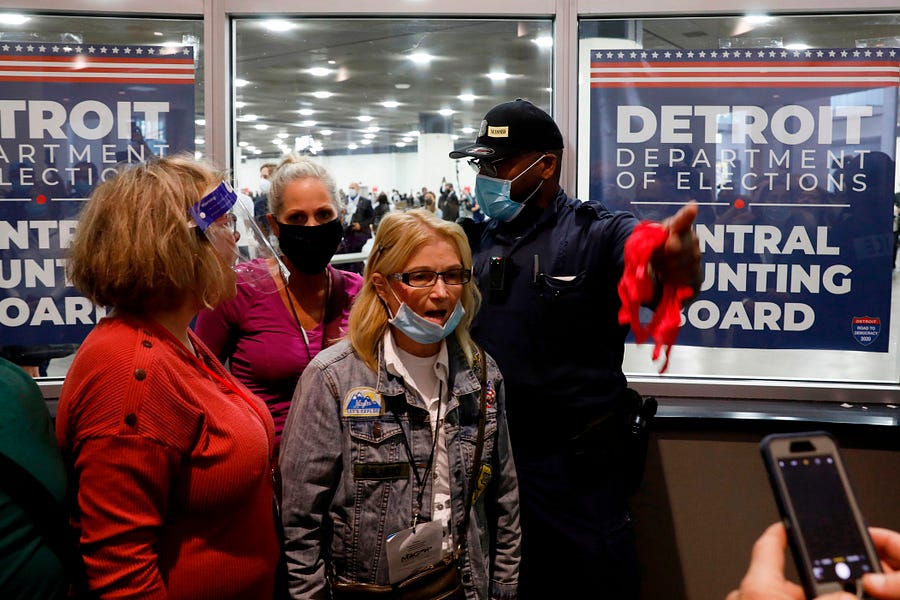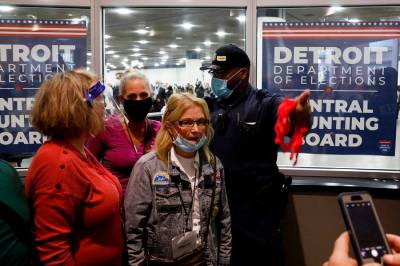On Wednesday, President Trump tweeted that in Detroit “there are far more votes than people,” adding to the growing list of claims of alleged voter fraud in the presidential election by the Trump campaign.
This is a false claim.
The city of Detroit has 504,714 registered voters and reported that 250,138 people voted. That’s a turnout of 49.56 percent, according to unofficial results from the city of Detroit. Per the U.S. Census Bureau's 2019 data, Detroit's population estimate is pegged at around 670,031.
The false claims have their origin in the fact that Wayne County, where Detroit is located, reported inconsistencies in which the number of votes didn’t match the number of voters listed in certain precincts. This involved 17 percent of the precincts in the city and a small number of votes, as reported by the Detroit Free Press:
“Of Detroit's 503 Election Day precincts, 85 recorded unexplained discrepancies in the vote totals as did 94 of the city's 134 absent voter counting boards. The majority of Election Day precincts and absent voter counting boards that were not in "balance," recorded discrepancies of three votes or less. Ten Election Day precincts and 43 absent voter counting boards recorded discrepancies of four or more votes. The discrepancies amount to roughly 400 votes.”
These types of “out of balance” precincts are common during the canvassing process. Gregory Mahar, director of elections in Wayne County, told the Washington Post that this “type of error is common” and can usually be explained by “human error or computer malfunction.” And again, Mahar said the errors were minor, and only the difference of a couple of votes per precinct.
Two Republicans on the Wayne County Board of Canvassers initially refused to certify the county’s results on Tuesday. After a reported “three hours of anger,” the two Republicans did agree to certify the election results. Now, however, they have signed affidavits alleging they were “improperly pressured into certifying the election,” according to the Washington Post. The two Republicans also accused Democrats of going back on a promise to audit Detroit votes.
In a press conference on Thursday, Rudy Giuliani, Trump’s personal attorney, echoed a similar sentiment to Trump, falsely claiming that there were more votes than registered voters in Detroit: “The overvote was so high. Monstrously high in about two-thirds of the precincts in the city of Detroit. Which means magically two and three times the number of registered voters turned out to vote.”
Again, as mentioned, Giuliani’s reference to out-of-balance precincts is not evidence of voter fraud, but rather, a common clerical issue, which in this case, amounts to approximately 400 votes.
Giuliani also falsely claimed on Thursday that the Wayne County Board of Supervisors decertified election results. “A case that we dismissed today because that case was attempting to get the Wayne County Board of Supervisors to decertify. Well they did. They decertified.”
This never happened. Democratic Vice Chairman of the Board of Canvassers Jonathan Kinloch said, as reported by CNN, that “board members’ votes cannot be changed after the fact.”
According to the Michigan secretary of state office, it is not possible for board members to rescind their votes.Tracy Wimmer, a spokesperson for the Michigan secretary of state, told The Dispatch Fact Check via email: “There is no legal mechanism for them to rescind their vote. Their job is done and the next step in the process is for the Board of State Canvassers to meet and certify.”
Michigan Secretary of State Jocelyn Benson said in a tweet on Wednesday that “All 83 counties have voted to certify the results of the Nov. 3 election.” She also said the Board of State Canvassers is set to finalize the election results on November 23.
Photograph by Jeff Kowalsky/AFP/Getty Images.






Please note that we at The Dispatch hold ourselves, our work, and our commenters to a higher standard than other places on the internet. We welcome comments that foster genuine debate or discussion—including comments critical of us or our work—but responses that include ad hominem attacks on fellow Dispatch members or are intended to stoke fear and anger may be moderated.
With your membership, you only have the ability to comment on The Morning Dispatch articles. Consider upgrading to join the conversation everywhere.